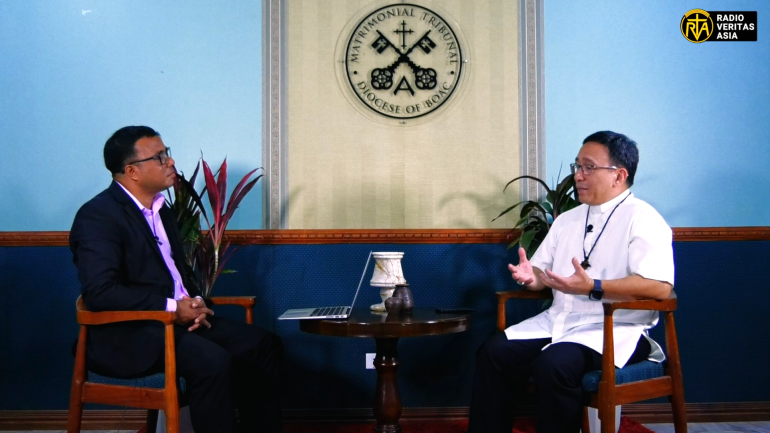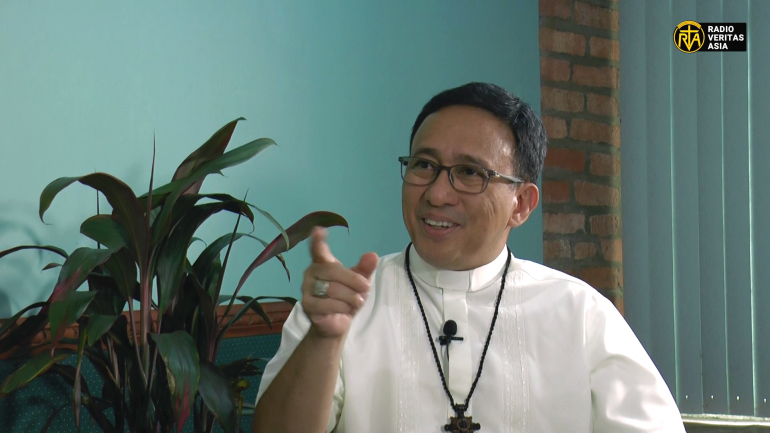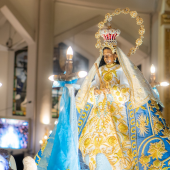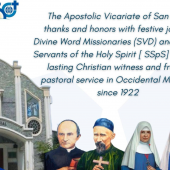‘Listen to the Poor because they also have the Message of the Gospel for us,’ says Filipino Bishop
In an exclusive interview, Marcelino Antonio Malabanan Maralit, the bishop of Marinduque, told Radio Veritas Asia that the faithful should help the poor because they, too, have the gospel message for others.
"We need to practice more often, and not only with great humility; we need to learn how to listen to the poor,” he said, adding that “we need to get the message of the Holy Father, who told us to listen to them because they also have the message of the gospel for us."
As he is affectionately known, Bishop Junie talked to Kasmir Nema of Radio Veritas Asia about how he has measured his faithfulness as a bishop by talking to the poor.
“Our life is a dialogue with the poor, and I think, and I believe, that that's the only way or measure I have of my fidelity as a bishop. If, as a bishop, I live in this dialogue with the poor, it won't be challenging in our diocese,” the bishop explained.
His program to rebuild homes for people affected by natural disasters, which has been going on since 2016, and the Cancer Warriors Foundation, which God used to save his life, were also examples of the bishop's devotion and missionary commitment to the poor.
"People think I have been helping the children, but deep inside my mind and heart, I know they were helping me," he said.

Bishop Junie was born on May 18, 1969, in Manila. Pope Francis appointed him bishop of the Diocese of Boac on December 31, 2014, as the fourth Bishop of Boac.
From 1989 to 1994, he studied sacred theology at the Universidad de Navarra in Pamplona, Spain. From 1999 to 2003, he studied ecclesiastical history at the Pontificia Universita Santa Croce in Rome.
The Diocese of Boac, on the island province of Marinduque, is 160 kilometres southeast of Manila. Marinduque is 959.2 square kilometres and has a population of about 200,000.
The diocese comprises fourteen parishes, four schools, and forty clergies. Other diocesan ministries include social action, formation, and church construction programs.
Regarding the participation of lay people, particularly women, in the church's ministry in his diocese, the bishop said many lay people and women have taken part in the church’s ministries in his diocese.
“One of the things I keep on discovering is that women are already making many decisions here on our island. They are the ones who are giving life to our faith on the island”, he said.
When asked about the meaning of his episcopal motto, "Fiat Mihi Secundum Verbum Tuum," (Let it be done to me according to Thy Word), he said that it refers to the surrender and submission of faith to the Lord.
“If I am to become Bishop, I need to be here with faith and surrender myself to him with humility, just like our blessed Mother,” he explained.
The second part of the interview, in which he talks about mission, synod, women empowerment, and their housing project is published on YouTube: https://www.youtube.com/watch?v=KlUsYHHR674
Read the full transcript of the interview below.

VOICE OF ASIAN BISHOPS
RVA Interview with Bishop Marcelino Antonio Malabanan Maralit of Marinduque, Philippines, by Fr. Kasmir Nema from Radio Veritas Asia.
Fr. Kasmir Nema: Your motto is "Fiat Mihi Secundum Verbum Tuum" (Be it done unto me according to thy word). Tell us this motto and how this motto has guided hear me?
Bishop Junie:
okay? It's very basic for me that this is my motto because I am a Marian priest if I may call myself one. So, no, I grew up as a young boy in the Archdiocese of Lipa from the city of Lipa. We're truly enough, it's deeply rooted in our Marian devotion. I grew up in a family that is devoted to our Blessed Mother. I grew up praying the Rosary. I grew up going to a church that is dedicated to her. I grew up with nuns around nuns who constantly reminded me of the Blessed Mother. And not only did I grow up with that experience, but when I became a seminary priest, I have always had that experience when I'm in trouble. The blessed mother finds a way for me to come back and that's one experience that will never leave my memories and my heart. And because of that, I kept on realizing that I am, the son of the Blessed Mother. So, if I really want to be faithful to her son, I need to be like, her. I need to become like her. And if there is any expression that I believe, Would guide me best in my life as a bishop especially were these words of our Blessed Mother from Luke 1:38 let it be done to me according to Thy word, which simply is a surrender and Obedience of faith. And I think that's what I needed back then. Then that if I am to become Bishop, who's faithful to God, I need to obey him with faith and I need to surrender myself to him with humility just like our blessed Mother.
Fr. Kasmir Nema: If FABC has the famous Mantra of triple dialogue, dialogue with religion, cultures and the poor, you know. My question is how dialogue with culture and the poor have been implemented in your diocese Bishop
Bishop Junie:
Well, for one in 2003, we had a synod, and the diocesan Synod resulted in a lot of decrees. Because our first Bishop Bishop Rafael Lim had this vision of our diocese, which is we are to be a church of the poor that lives in Justice. Charity. And this is a church that needs to really live in accordance with that vision. So in that reality, the synodal decrees brought about certain instructions for us as a diocese and it includes all of these dialogues already specifically. The dialogue of culture our diocese has a small island but it is quite famous for its culture which is very, very Catholic and very religious. We have the famous Moriones Festival here which only happens during Holy Week. So you can already see it's quite connected to our faith. Not only is it about that but a lot of our culture is based also on experiences of faith. For example: we have what we call the Putong which is a welcoming rite that people practice wherever here in the diocese, wherever on the island for people who would come, we will welcome them with this rite But this right was I right? That was Thought often created by a priest. And it contains a lot of stories about Jesus travelling. A lot of stories about how one as a Christian should accept another person. So basically, when it comes to culture, our culture by itself is already dialoguing with us. So when I came here I got to really learn a lot about the people and about faith through culture. So I think it's already part of who we are culture. So the dialogue with culture is so much part of who we are. That's one dialogue with the poor. Now that's very important because we are an island. In fact, if you go to Wikipedia
you will see that this is a poor diocese so by characteristic, we are already poor. So in reality, our life is a dialogue with the poor and I think and I believe that that's the only way or the only measure I have of my fidelity as a bishop and what is that? If as a bishop I live in this dialogue with the poor and it won't be very difficult in our diocese, especially now with the synodal consultation that we have had which I think
Is very, very important for all of us, not only for my diocese, but for all of us because it really reopened and when you were in, I think we need to practice more often and not only that with great humility, and what is that to learn how to listen to the poor? I don't know. But maybe we have been too used to instructing the poor preaching to the poor telling the poor that this is the message of the gospel for getting message of the Holy Father told us to listen to them because they have also the message of the gospel for us and I think with what has happened with this invitation of the Holy Father, it has reopened venues reopened, I mean it's already there but we just have to reopen it and it has really reopened for me and for my brother priests lot of realizations that in this dialogue. Maybe for quite some time, it has become a monologue and it's about time that we start again, listening to them so that it becomes again, a dialogue with the poor. So basically, that's my experience here.
Fr. Kasmir Nema: Besides this thought for the Day program. You also have another program called rebuilding houses for people affected by calamities. Can you tell us more about this program?
Bishop Junie:
This is a pastoral program basically, because one of the experiences I have had here on the island, was that when typhoons pass through our Island, our Island, really suffers a lot. And one of the sufferings that we all experience is the destruction of homes and houses basically. And so in my first year more or less, we were hit by typhoon Nina. I don't know, it's the international name. But back then it was called Nina or Nina here in the Philippines and it hit us hard. In fact, it was December 26. I will never forget when the typhoon hit us and I went around. A day after the typhoon. I had to go around the whole diocese just to see how the churches are, but I didn't notice only the destruction, it had to our parishes. I noticed the destruction. It had cost to our people. So many houses were destroyed and that caused an uneasy feeling in me. So I had to ask our people here in our priest, what can we do for these people? So one of the things that we did was asked for funding from different groups and we used all and we pulled all resources in that sense to rebuild around. I'm not mistaken during that time around 300 houses. But we could have built more. If we use the old formula that they had, which was basically used around 39 thousand pesos, and give it to one family and help them build their homes. But in experience, what we saw was that if you build a house, so cheaply, the next typhoon will destroy it again. So we made the decision that maybe we have to build less houses but stronger ones. So in this project, we decided to do that in 2016 started that year, but we said so many houses were destroyed and yet we can only rebuild so few. So, what do we do? Let's rebuild houses every year. So since then, every year we target a few houses that we can rebuild and make stronger. So that, when the next typhoon comes, we have less people to worry about whose houses were destroyed. So basically, that's one of the projects that we have, and we will continue, I believe. Until the time that I am still the bishop of the diocese, every year, I will still have to find and look for funds. Well, we can use it to rebuild houses, especially for the poor and hopefully. we can really lessen and make a big dent in that one problem that we always see when typhoons passed by our Island. And that is so many houses are being destroyed by the strong winds.
Fr. Kasmir Nema: The idea of Lay participation in the ministry of the church is one of the core principles of this Synodality. How has this concept, specifically women's participation been implemented in your diocese?
Bishop Junie:
You know what? Maybe I don't even I don’t implement it because the reality of the church here on our island is that, the majority of those who are active in the church are women. That's already the truth. That one cannot deny.
second, I think the majority of our leaders are women Presidents of the parish pastoral Council. Our pastoral workers in the diocese are women, and almost all of them are women. The majority of them are the only thing I may be that we don't have much here. Is that we don't have many female congregations. I wish we had, I have been inviting some of the congregation but seemingly our small island is not worth coming to yet because I have been trying to bring in some religious orders that could help us, especially in the Pastoral planning and maybe the implementation of certain plaster plus that we have especially for the poor. So, in other words, one of the things that I keep on discovering is that women are already making a lot of decisions here on our Island.
And not only that, but they are also the ones who are giving life to our faith in the island. So, is there something that we need to change? Yes, maybe especially when it comes to decisions. Making, for example, one of our plans, I'm still trying to fix our diocesan pastoral Council. I formed the first diocesan pastoral Secretariat to fix all the details and all the policies. So that when I start calling for diocesan pastoral counselling, it will already be already organized in such a way. And one of the things that we have, that we have thought of and made the decision about is that when we start calling for the diocesan pastoral counselling, it has to be in majority laity. And a big part of that deciding body, a lot of them was being women because they are already the leaders of our commissions. So with that, I don't know what else we have to do. I do not have any idea because experienced women here are very influential already in the church.
Fr. Kasmir Nema: Pope Francis perhaps the first in our history, put so much effort. How to involve women in the structure of the church. Already asked you a question but women’s participation. But in a particular way, how do you see not only human but women's participation, but It's women empowerment in the church? It's a bishop, not only talking in your diocese, but also in the Philippines. You know, how do you see this idea of women’s empowerment?
BihsopJunie:
Well, for me, it's very welcome. Not only idea, but I also hope it is a very welcome culture and practice in the church. Why? Because again we have to accept it. Men do not have the Monopoly on wisdom, and neither do women. We do not have the Monopoly on being, right, neither do women. So just think about it. If that is the truth, then the combination between men and women is necessary. Women can make better decisions than men. Men can make better decisions. Why don't we combine them? So that we can have the best decision to be made. That's one, so women empowerment in that sense, I think it's very important and I think it's high time that we really make it concrete and practical, especially in decision-making. Because one of the things that I keep on, maybe discovering in the church is that we still have a lot of room for us in the hierarchy specifically which is basically almost all of us men. There is so much room for us to learn how to listen to women. Still, very few women are given the chance to speak out. Still very few. Women are given the chance to maybe bring out their ideas and maybe I hope also, women would realize that they should really in a certain way. Not impose themselves but rather prove themselves better in that sense to be. No. Don't worry if you trust us, we are trustworthy. If you listen to us, we are worth listening to and I think that's where we all are right now. And I think women not only the religious, even the laity, have already proven themselves, with great minds, big hearts and truly faithful lives and I would always recommend, Just look at me. I'm born of a woman who is of strong character. My mother is one of my greatest examples. She has been very much part of who I am in so many ways because of how she spoke to me. How when I'm wrong she would remind me and when I need some wisdom. She will give counsel to me, that's a woman. And I think if the church becomes that kind of a church hopefully now it is happening. I think we will grow more as a church because I did nobody has the Monopoly of being, right? Nobody has the Monopoly on wisdom. Nobody has the Monopoly of Grace. So I think, in that sense, That is so much to be done and yet there is already so much being seen in the church.
Fr. Kasmir Nema: let's go back to some of your involvements in particular Mission. I would say because you become involved in an organization called cancer survivors. Can you tell us about this organization and how this affects you and the people?
Bishop Junie:
And of course, the people, yeah, this is another long story because the cancer Warriors Foundation is a foundation that has. If I may say these words, it's a tool that God used to save me. It's very interesting to hear that, right? A bishop told us that he was saved, because when I was a young priest, I again, had my bad experiences, I had my sinful moments and I was already at a loss I would admit it to others and I already told the story in the world Apostolic Congress on Mercy last 2016 wherein I was already contemplating leaving the priesthood back then but for whatever reason God really finds away our blessed mother finds a way to save me. I was sent two angels. I was in the Seminary and a woman with her son came. This woman started crying in our lobby saying that she didn't want her son to die. I asked her. Why would her son die? That she said? My son has cancer. Had leukemia, but humanly, I was touched. I felt strong guilt. And then I told that mother doesn’t worry, I will help you take care of your son. She was a poor woman. I only said it out of my pride, rather than out of humility, not knowing what I meant by my promise. And then with this young boy, I started now helping him out learning that whatever I was earning was not enough. But God placed a game with our lives, sometimes that is meant to really show us the way. Why? Because when I was about to finish, my help to this young boy because he was finishing, also his therapy his chemotherapy, I was so glad not because she was getting well, I was so glad because now, once again, my money will be mine, my own. I can use it for my own pleasure in my own, but you know what suddenly God Gave Me. Not only one boy gave me another 26 children with cancer. And I had to promise now that I would also help them not knowing that little by little. I never really noticed that. I was already contemplating leaving the priesthood back then. And yet with that one, boy, I forgot about it. And then 26 came. All of that. The Experience from that one boy to the 26. And now we already have more than 500 kids. All the experiences were experiences of Grace and blessings. I felt so little. Just as I mentioned, a little while ago, obstacles do remind us of how important God this, you know, how little we are. But then the more children who are coming in, the more people I had to help the more I realized I had nothing. The less of whatever I did became clearer. And because of that, I became more spiritual still a long story, but to make it short for these children, I continue to help these with this. I already, well, formed a community of people volunteers who are part of this community and are helping these children. As I mentioned, we have more than 500 now and we continue to help them. And all of this is but Grace. And the only thing I Can say is that these children were the tools and instruments that God made sure that I would have so that I will be saved. And I believe that, who I am right now, is very much a big part of this because of who they were in my life said, they are. People think I have been helping them, but deep inside in my heart, I know it was them helping me and in fact, my coat of arms as you have already read "Fiat Mihi Secundum Verbum Tuum" you will also see Ave Maria, the AM, but you will see also below it. Well, circles, small circles and then cones represented, the children, they are little children and are so much part of that experience of redemption that I have had with them. So that for me is what cancer warrior you say.
Radio Veritas Asia (RVA), a media platform of the Catholic Church, aims to share Christ. RVA started in 1969 as a continental Catholic radio station to serve Asian countries in their respective local language, thus earning the tag “the Voice of Asian Christianity.” Responding to the emerging context, RVA embraced media platforms to connect with the global Asian audience via its 21 language websites and various social media platforms.














